Armed And Ready
by the Michael Schenker Group
********************
This section, which was started April 28, 2007, includes Songfacts which were submitted to the Songfacts database and either edited out of recognition or not published. Also included will be Songfacts which have already been entered into the database by other contributors. On August 10, 2023, I added screengrabs of 8 songfacts that had been saved to my hard disk, the relevant HTML files having been infected with a non-malicious code that directed the viewer elsewhere.
********************

********************
Because He Loves Me
Although this song was used in the 1961 film A Taste Of Honey it had been around for some time before that because its composer, Harry Castling, died in 1933. Anyone who has heard Dora Bryan’s rendition will wonder why it was not buried with him.
A Taste Of Honey was released in September 1961, but unfortunately Because He Loves Me was resurrected as the B Side of the 1964 release Oh, Oh, Oh, Oh, Seven. That is not to suggest that this particular piece of vinyl had an A Side; both songs are equally bad.
********************
This is my original songfact before it was totally rewritten.
********************
Boom Boom (Out Go The Lights)
credited here to Pat Travers

********************
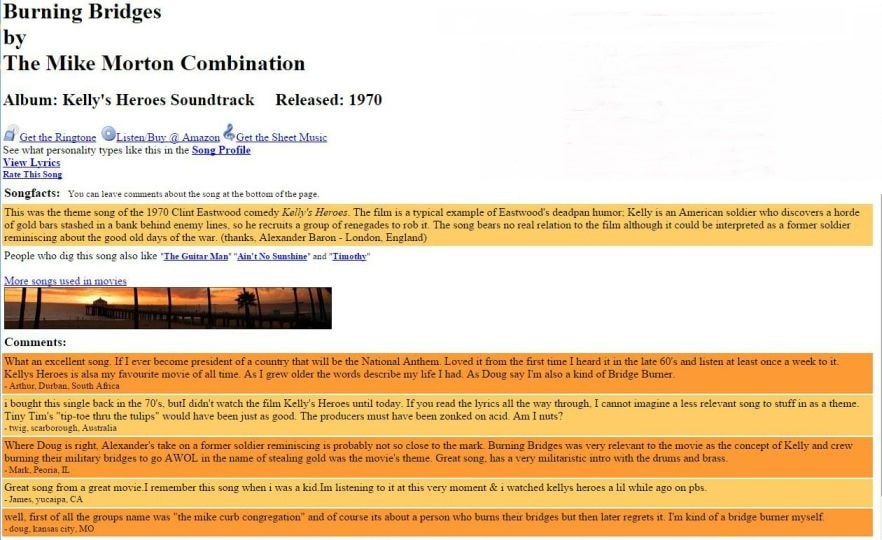
The above is the original songfact for Burning Bridges which was replaced at some point by the one immediately below. When I bought the record shortly after seeing Kelly’s Heroes at the cinema, it was credited to The Mike Morton Combination.
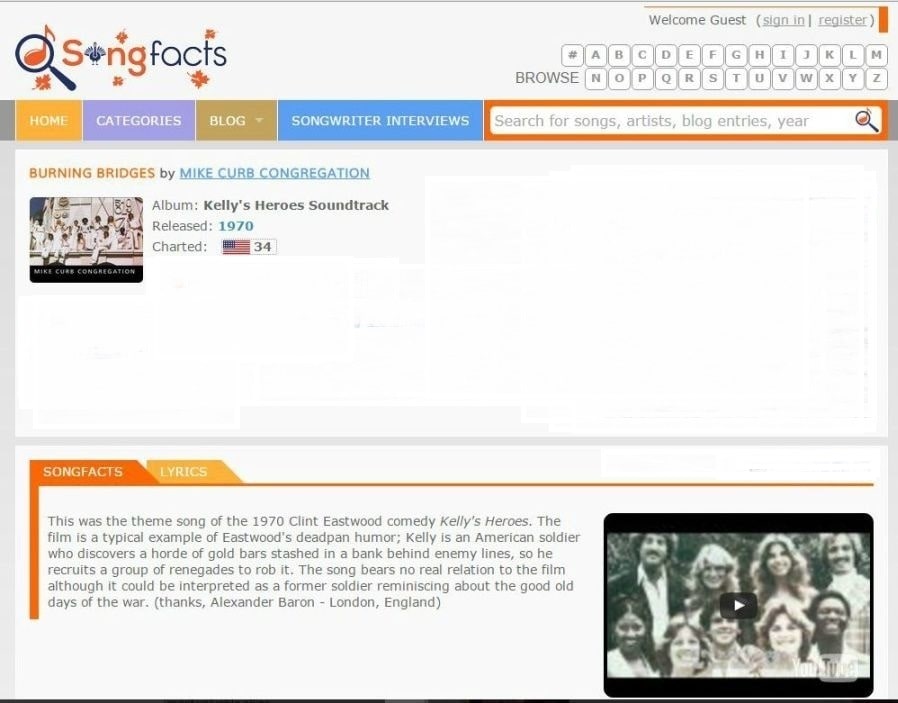
********************
In 1940, a slightly reworded version of this slow nostalgic 19th Century number was adopted as the Official State Song Of Virginia, but on January 28, 1997, the Virginia Senate decided by 24 votes to 15 to designate it “State Song Emeritus”. This was due to unremitting pressure in the age of political correctness. Carry Me Back To Old Virginny is a coon song first published in 1878 and written from the perspective of a slave. This led to its being branded racist, whatever that is supposed to mean. The refutation of this facile assertion is the long list of black artists who have queued up to record it, including Louis Armstrong and Ray Charles.
The real joker in the pack though is the song’s writer, who rather than being a white Southerner, bigoted or otherwise, was actually a black Northerner. Few musicologists would disagree with the assessment of Derek Scott in The Singing Bourgeois that James Bland was “the finest minstrel composer of the 1870s and 80s”.
Bland, the son of the first Negro US patent examiner, attended the prestigious Howard University, but instead of following his father into the legal profession, he fell in love with music on campus, and carved out an illustrious career for himself which saw “The World’s Greatest Minstrel Man” wow audiences in the English music halls. According to The Tin Pan Alley Song Encyclopedia, he “drew on his memories of a peaceful plantation on the James River and wrote the nostalgic number about an old slave who wishes to be brought back to the South where he was born”.
It may be too that Bland was influenced by an earlier song, Carry Me Back To Old Virginia, which was arranged and sung by E.P. Christy in 1847 (though Christy’s song was actually about a boat!)
Bland’s composition – his most famous – was introduced by the white artist George Primrose (who performed in blackface), was “a longtime staple in minstrel shows”, and remained popular long after minstrelsy was eclipsed by Vaudeville, ragtime and jazz. The earliest recording appears to be by Alma Gluck in 1915, and it was sung by Nelson Eddy in the 1937 film Maytime, among others.
********************
Choucoune
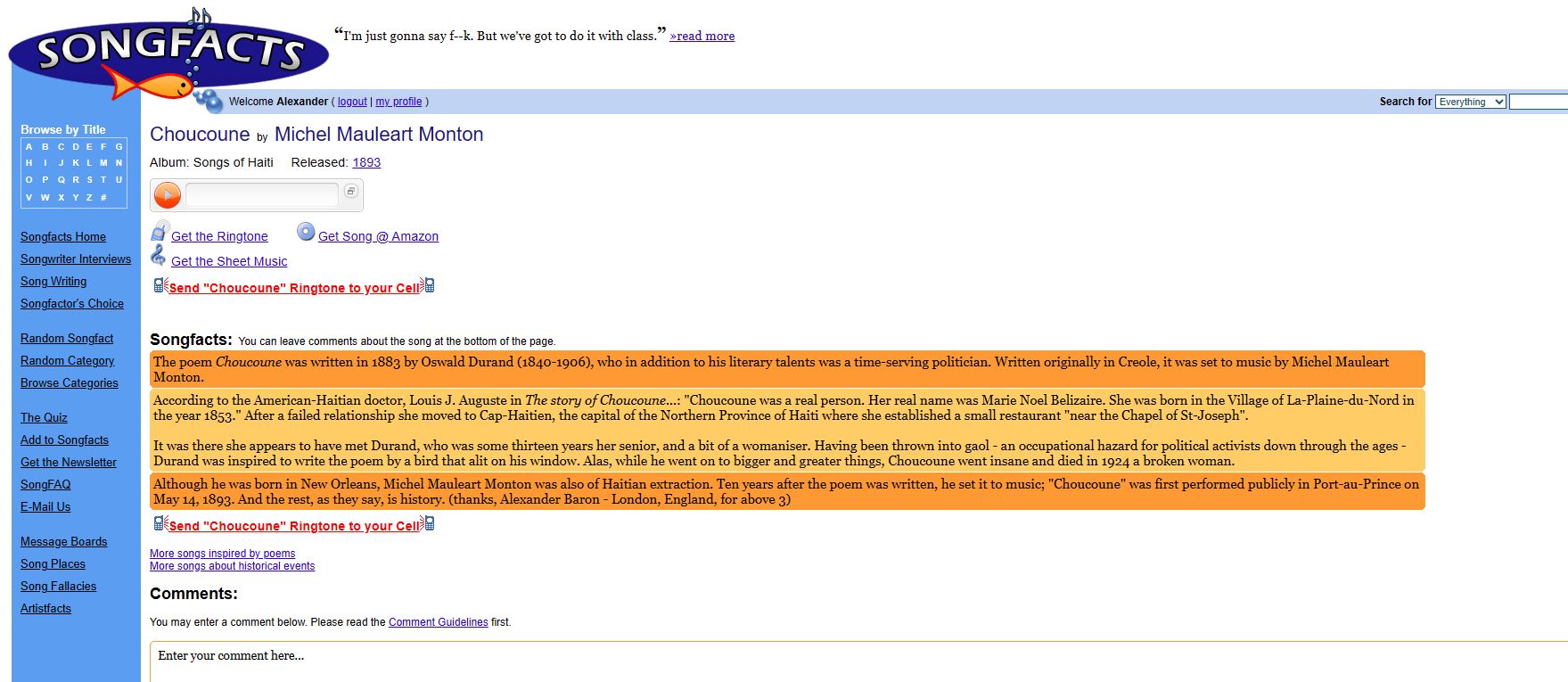
********************
Destiny Bends
Rap musicians are not noted for their sentimentality, so this downtempo tribute song by RZA comes as a pleasant surprise.
The actor Paul Walker was killed in a car crash on November 30, 2013 at the age of forty. RZA had worked with Walker on the film Brick Mansion. Running to 3 minutes 52 seconds, Destiny Bends is both self-explanatory and a really nice touch.
********************
This is a tribute song, a highly imaginative one. Emma Humphreys was born in Wales on October 30, 1967, the second of three daughters. After her parents’ marriage broke up, her mother remarried, and she was taken to Canada.
She was, to put it mildly, a troubled child, and from the age of 12 began running away from home. She was sent to England to live with her father, decided shortly to return to Canada, but the Canadians didn’t want her, and eventually she ended up at the age of 17 living in Nottingham with Trevor Armitage, and working as a prostitute. He was said to have lived partially off her earnings, but he was not a pimp in the accepted sense.
In February 1985, she stabbed Armitage through the heart for no apparent reason, and in December the same year was ordered to be detained at Her Majesty’s Pleasure. She appealed her murder conviction the following year but abandoned it and was resigned to serving her sentence.
Several years later she read about an organisation that was lobbying on behalf of women who had been convicted of murdering men, with extraordinary if unwarranted success. The end result was that in 1995 this organisation succeeded in taking her case back to the Court of Appeal where her murder conviction was quashed, and she walked free to the cheers of hundreds of women.
Three years later she was dead from a drug overdose that may have been accidental. Like this song, the Emma Humphreys story has been written to a bizarre feminist narrative that blames everything she did on men. Julie McNamara knew Humphreys personally, but her claim that “...you never got to choose” is simply so wrong. Humphreys had plenty of choices. The claim that she had been repeatedly raped by Trevor Armitage and was afraid he would rape her again does not withstand the slightest scrutiny. Shortly before she murdered him, he threw her out, which resulted in her trashing his home and being charged with criminal damage. After breaking her bail conditions, she was remanded in custody, but Armitage took her back, attending her sentencing hearing to do so.
In 2003, her champions Harriet Wistrich and Julie Bindel published The Map Of My Life... a virtual hagiography that included Humphreys’ writings, but it is clear even from this that the dead woman was no saint.
They wrote: “Within five days of her release, Emma was in the Whittington hospital having overdosed on chloral hydrate. During the first eighteen months of her freedom, Emma ran wild. She drank and took all manner of drugs to excess; she continued to self-harm by cutting up, through serious anorexia and by getting into dangerous situations with the sort of men who prey on vulnerable women. She was thrown out of the therapeutic community she was living in, having broken every rule; she was likewise thrown out of a mental health hostel and a number of other forms of accommodation found for her”.
Again, it is men who are to blame, rather than her.
Incredibly, Wistrich and Bindel went on to found the Emma Humphreys Memorial Prize “to provide recognition for work against violence and to bring it to the attention of a wider public”.
********************
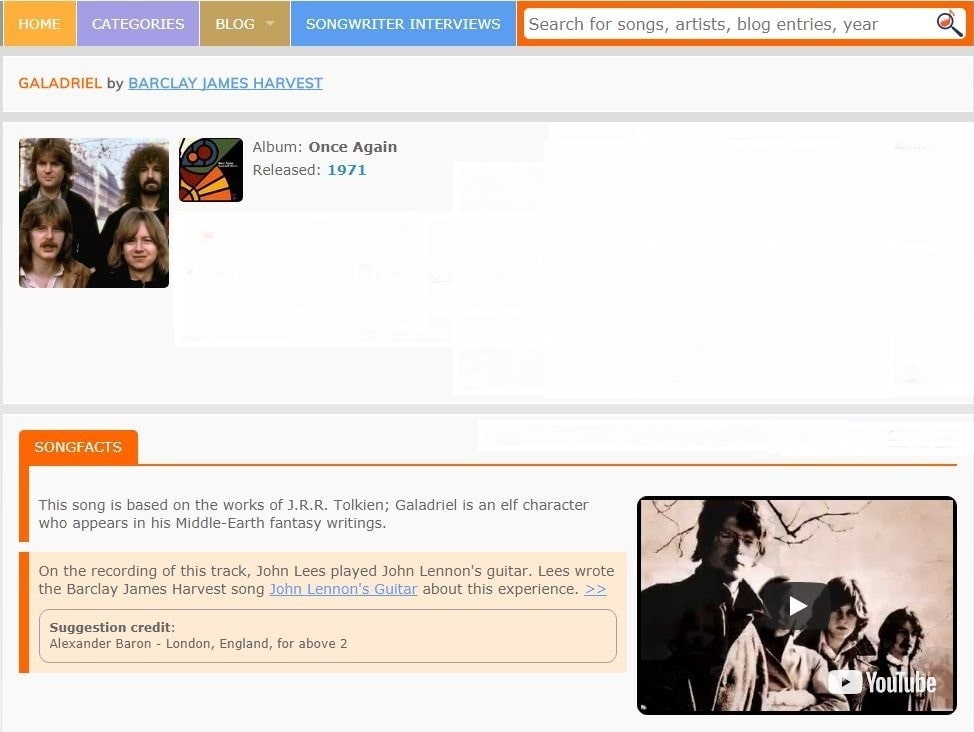
Song Image for the above; the latter has been deleted.

********************
The songfact below was published originally circa December 9, 2007.
As the reader will see, it has since been edited drastically and my lengthy comment removed. I don’t blame Carl for this in the current climate.
The songfact is followed by the two comments published in reverse chronological order then the song image. Here is the original archived link.
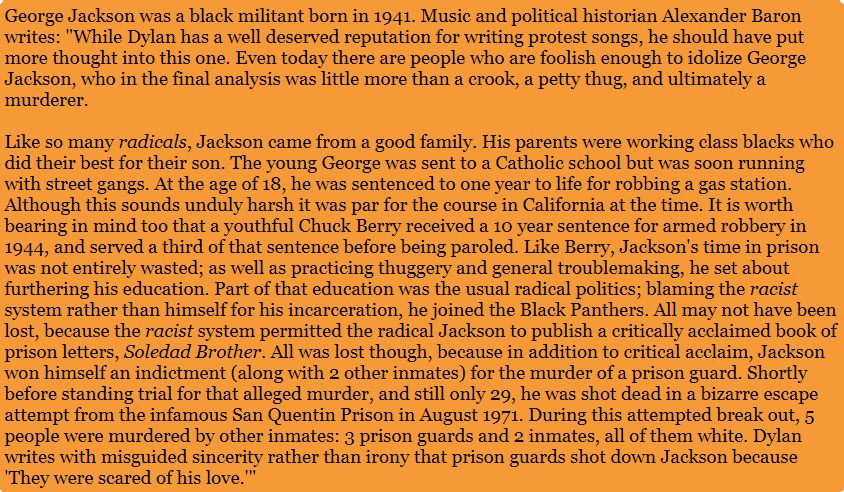
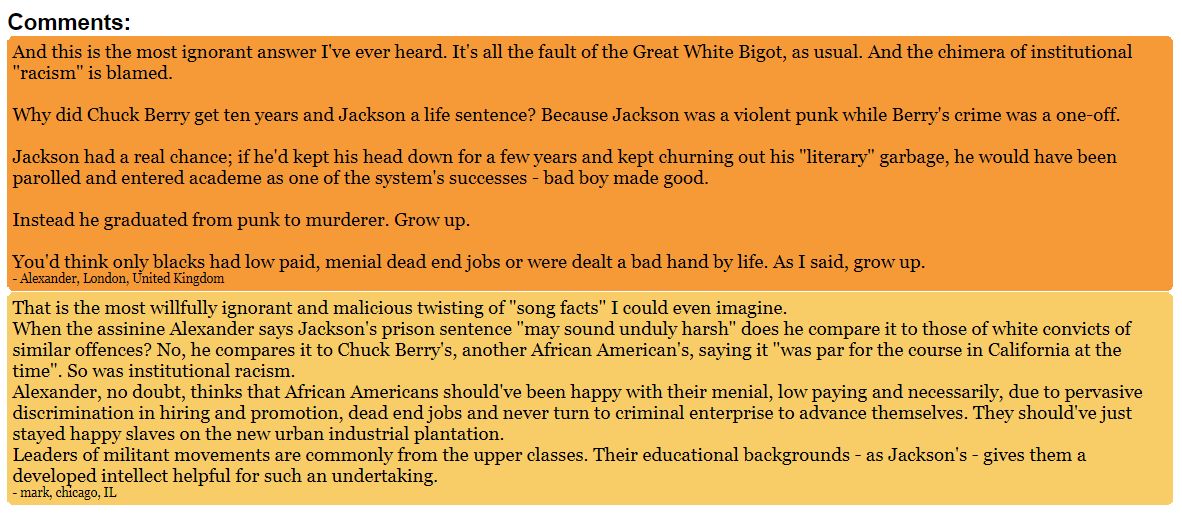

********************

Song Image for the above; the latter has been deleted.

********************
This is an exceptionally beautiful song, melodically and lyrically, even for Mr Blackmore and his Faerie Queen. In an October 2006 interview with Susan Henderson, Candice said it is “about an old gnarled tree that used to be out here on someone’s lawn. Was it really a tree used for hanging people centuries ago? Probably not…but maybe… I love taking a story and turning it from black and white into color.”
[The above is the songfact as originally submitted December 26, 2015.]
********************
Indiana wanted him because he defended his lady’s honour, apparently with a gun. In the July 6, 1974 issue of Melody Maker, Taylor explained the inspiration for the song.
“I was living in a fleabag hotel and one night I heard these sirens and somebody was breaking in a store below. I looked out and police had surrounded this store and I turned my tape-recorder on. I saw Bonnie And Clyde a couple of times and with those two things that’s how I came to write Indiana”.
The opening strains of the song include a police siren, and towards the end a police radio says “This is the police; you are surrounded; give yourself up...” Along with There’s A Ghost In My House this was unarguably Taylor’s biggest hit, and unlike ...Ghost... it sold well on both sides of the Atlantic, topping the singles chart in his native Canada.
It was released on the Rare Earth label backed by Love’s Your Name and also on Tamla Motown backed by Gotta See Jane.
[The above was published originally by Songfacts; I’ve slightly altered the format of the original Melody Maker quote, italics, etc.]
********************
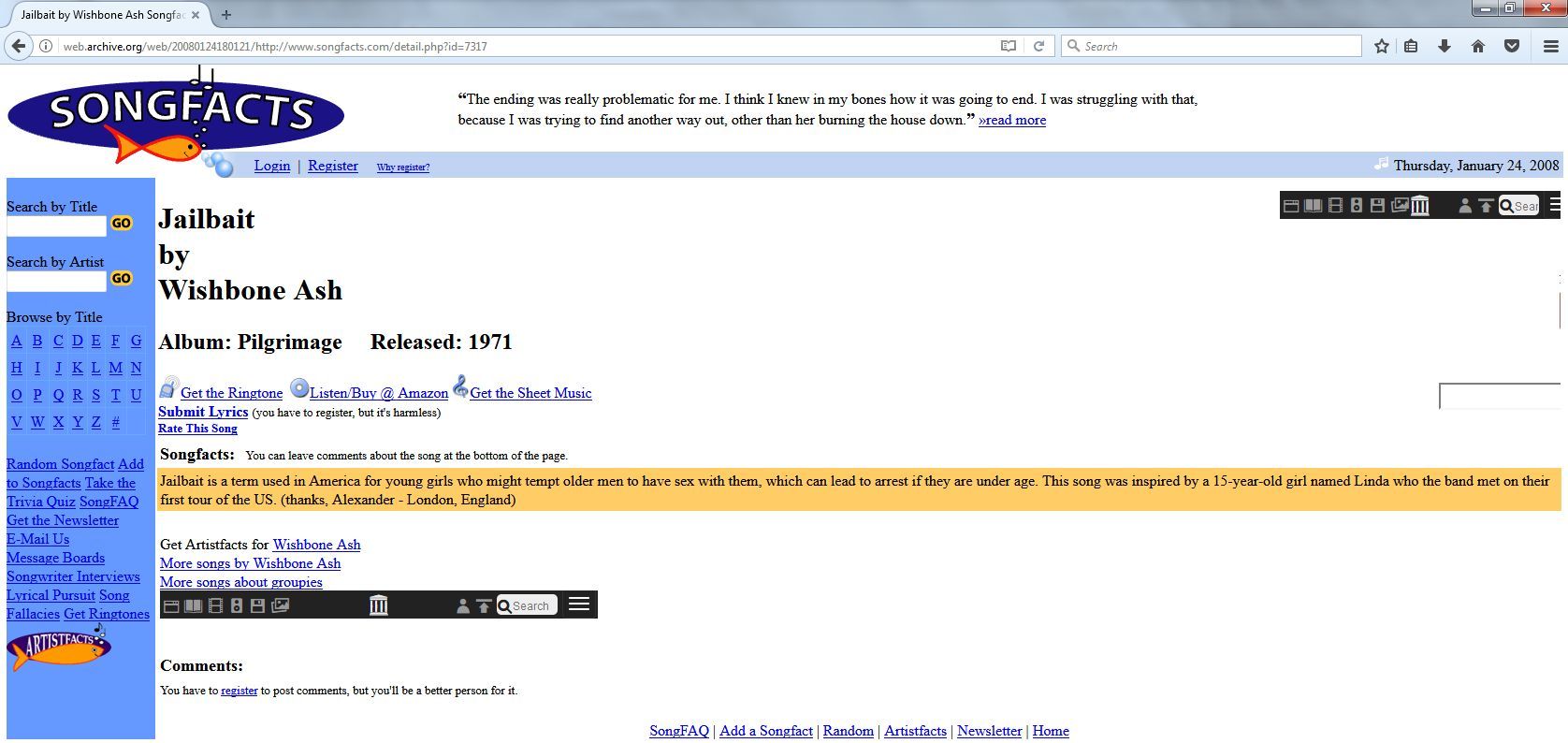
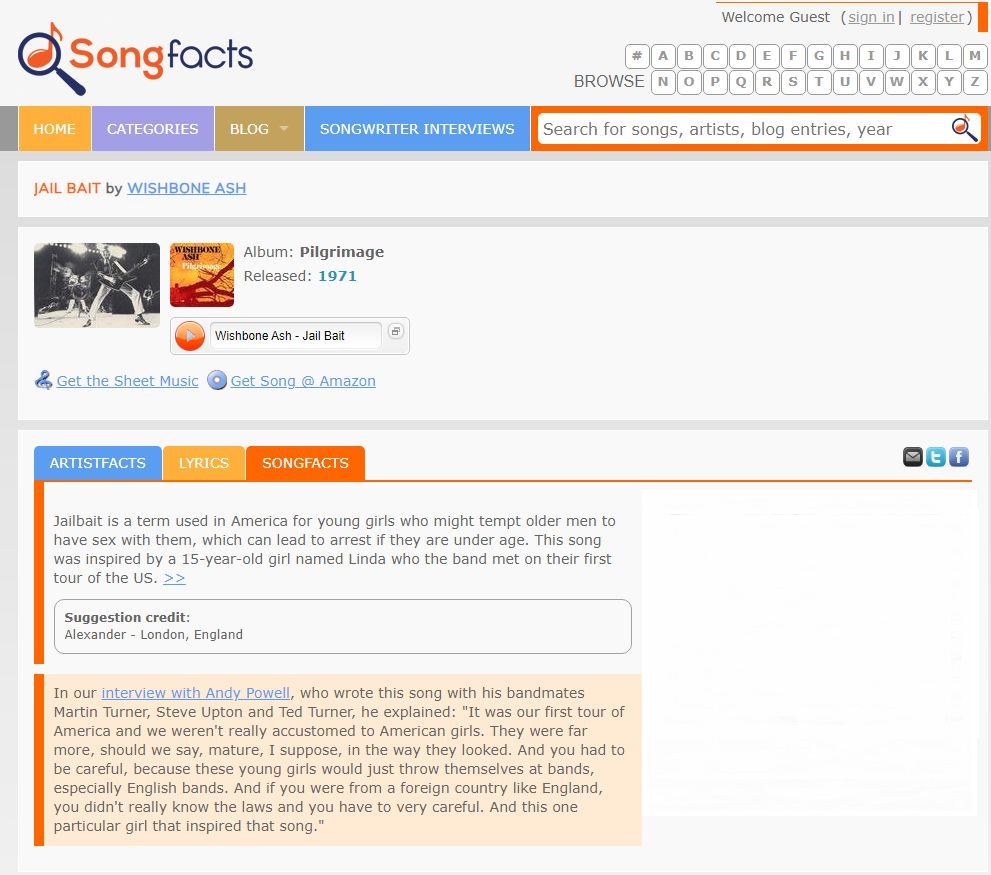
********************
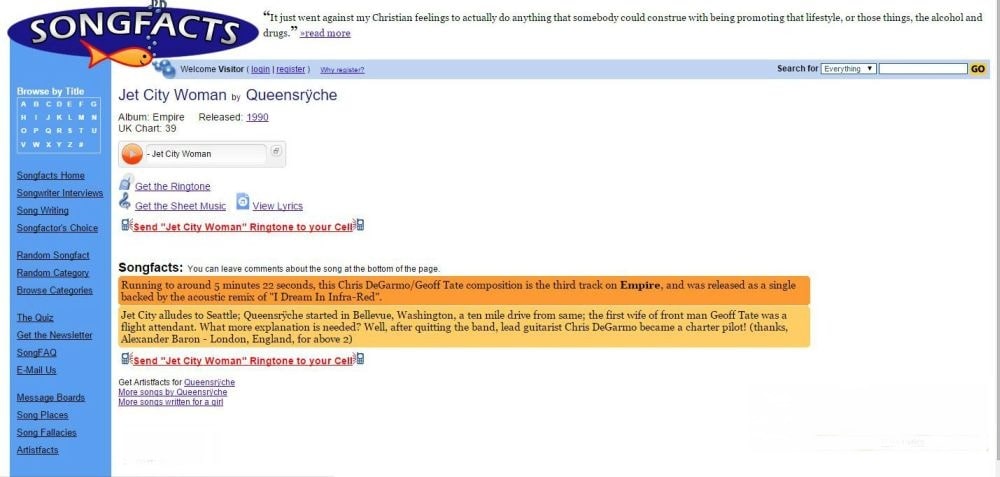
The above is the original songfact for Jet City Woman; below is the same songfact augmented after an interview with Geoff Tate. This flexibility is one of the things I like about SongFacts.
********************
On May 14, 2023, I noticed this songfact had been completely rewritten and my credit deleted.
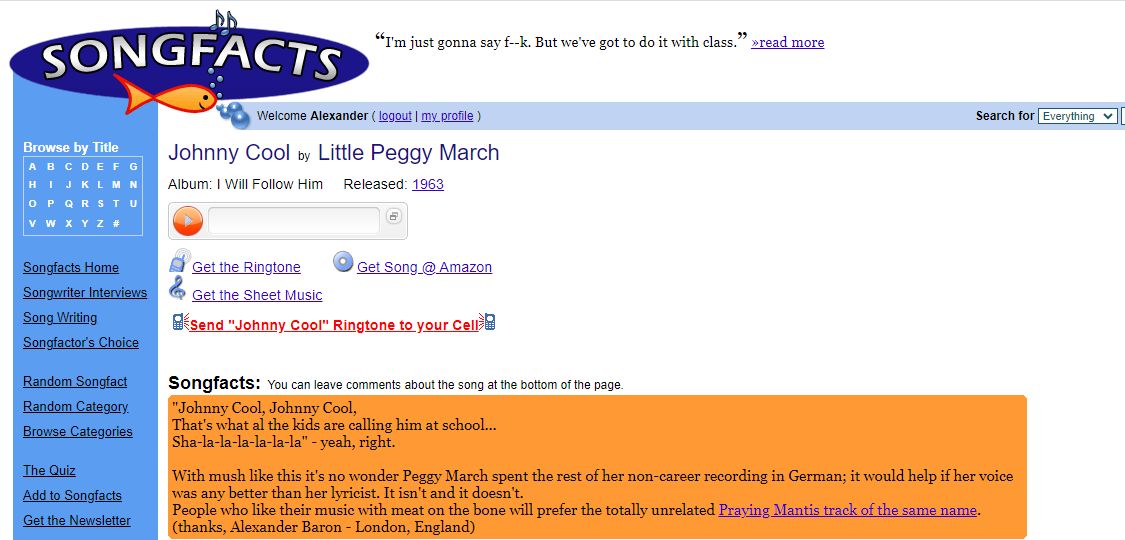
********************
A sample of the lyrics:
There’s all this heat
Out in the street
Telling us to move along
It’s gonna be a long hot summer
From now on
This is a song about the Stonewall Rebellion of June 1969. The Stonewall Inn was a bar in New York’s Greenwich Village, which was frequented by homosexuals. At that time – on both sides of the Atlantic – homosexuals were regarded as an easy target by the police, and establishments catering for them were subjected to arbitrary harassment. On this occasion though, a raid allegedly prompted by illegal drinking ended in violence. The patrons revolted, and over the course of the weekend a full scale riot and civil unrest resulted as outsiders joined in. The Encyclopedia Of Homosexuality says the Stonewall Rebellion was “a spontaneous act of resistance” to police harassment.
Happening as it did, at the end of the sixties, the Rebellion became part of the counterculture and folklore of resistance, which included student unrest and anti-Vietnam protests.
********************
This instrumental was written by session guitarist Bill Parkinson while he was playing with PJ Proby. He told this website he wrote it because the backing orchestra wanted a couple of instrumentals. The music was arranged by one of the band, and was subsequently used by Carlo Little as a drum solo. Little, who died in 2005, was the original drummer for The Rolling Stones; he also played with Screaming Lord Sutch in his band The Savages, where lead guitarist Ritchie Blackmore served timed before becoming a founder member of Deep Purple. It was Blackmore who borrowed – ie stole – the riff from Lost Soul for Mandrake Root, which appeared on the band’s debut album, Shades Of Deep Purple, in 1968.
********************
Love Came To Me The lovely Lynsey de Paul said of this song: “It was a really good pop record of its time. Certain songs have emotional associations in one’s life. This was almost a coming of age”.
Co-written by Dion himself and John Falbe, it was released on the Laurie label in 1962 backed by Little Girl, and was a top ten hit for him.
Sadly, love never quite came to Lynsey de Paul in the same fashion, and she never married.
by Dion
********************
Love Thy Neighbour ******************** Although it has words, Mandrake Root is primarily a solo, with a heavy emphasis on drumming. A single sheet of the basic music without the solos, was filed with the British Library (then the British Museum Library) for copyright purposes probably shortly after it was recorded; the manuscript claims Copyright 1968 by B. Feldman & Co trading as HEC MUSIC of London, and the song is credited to Rod Evans, Jon Lord, and Ritchie Blackmore.
However, anyone may claim the copyright or authorship of a song; A.P. Carter put his name to Wildwood Flower, but that doesn’t mean he actually wrote it, and the authorship of “Mandrake Root” is every bit as controversial as some of Carter’s shenannigans.
In the Jerry Bloom biography of Ritchie Blackmore, drummer Ricky Munro is quoted: “I co-wrote the song I invented all the drumming and the accents and he wrote the riff. It was more of an instrumental than a vocal song.” Blackmore had intended to use Mandrake Root as the theme song for a band he was putting together, but although Mandrake Root rehearsed, they never actually played a live gig.
While Munro’s claim to have co-written the song was made in good faith, he didn’t know that Blackmore had ripped it off, or at least the riff, from another guitarist. Nick (Nic) Simper, the original bassist with Deep Purple, is also quoted by Bloom: “Mandrake Root was written by a guy called Bill Parkinson and it was called Lost Soul originally.”
Parkinson had written the song as a drum solo for Carlo Little, the original drummer of the Rolling Stones who like Blackmore had played with The Savages, the backing band for Screaming Lord Sutch. Simper said Blackmore learned the melody “note for note” from Little. Bill Parkinson was lead guitarist with the Savages July to September 1966; Blackmore had played with Sutch from May to October 1962, February to May 1965 and December 1966 to April 1967, so their paths had clearly crossed.
Mandrake Root was the first song ever recorded by Deep Purple, and although they ended their first show (in Denmark) with Hey Joe, it would soon become their closing number, and remained so for the next three years. Like the rest of their debut album it was recorded at Pye’s Marble Arch studios over a weekend in May 1968, after their Danish tour, and produced by Derek Lawrence.
The original recording ran to 6 minutes 9 seconds, although like the instrumental Wring That Neck from their second album, it was often stretched out to half an hour or more in concert.
In view of the extraordinary success of the fledgeling band, it was not surprising that word soon got back to Parkinson, and just as unsurprisingly he was not happy with regard to (what he saw as) the rip off of Mandrake Root, and turned up on Simper’s doorstep to complain. By this time, Simper had left the band, Parkinson threatened court action, he said, and Simper agreed with some reluctance to testify for him, but “...I never saw Bill again. Apparently they paid him off with about £600.”
In December 2008, Bill Parkinson confirmed the above facts in a telephone interview, as far as he recalled he’d settled for five hundred pounds. He could have got more, but money was tight in those days. This sort of thing was and still is rife in the music business, he said, citing the case of The Lion Sleeps Tonight. He added that the riff from Lost Soul isn’t that different note-wise from the most famous riff in rock, for which Blackmore is also credited, but pursuing a claim for Smoke On The Water would open up a whole new can of worms!
Parkinson said too that when at last he’d run into Blackmore some time later, his fellow axeman had complimented him on Lost Soul and asked “Have you got any more like that?” Needless to say, he was not amused.
Although Blackmore did undoubtedly rip off Mandrake Root from Lost Soul, it remains to be seen to what extent the two tracks can be considered the same piece of music; there are only so many ways an eight note scale can be played, intervals, sharps and flats considered!
by Stuart Gillies
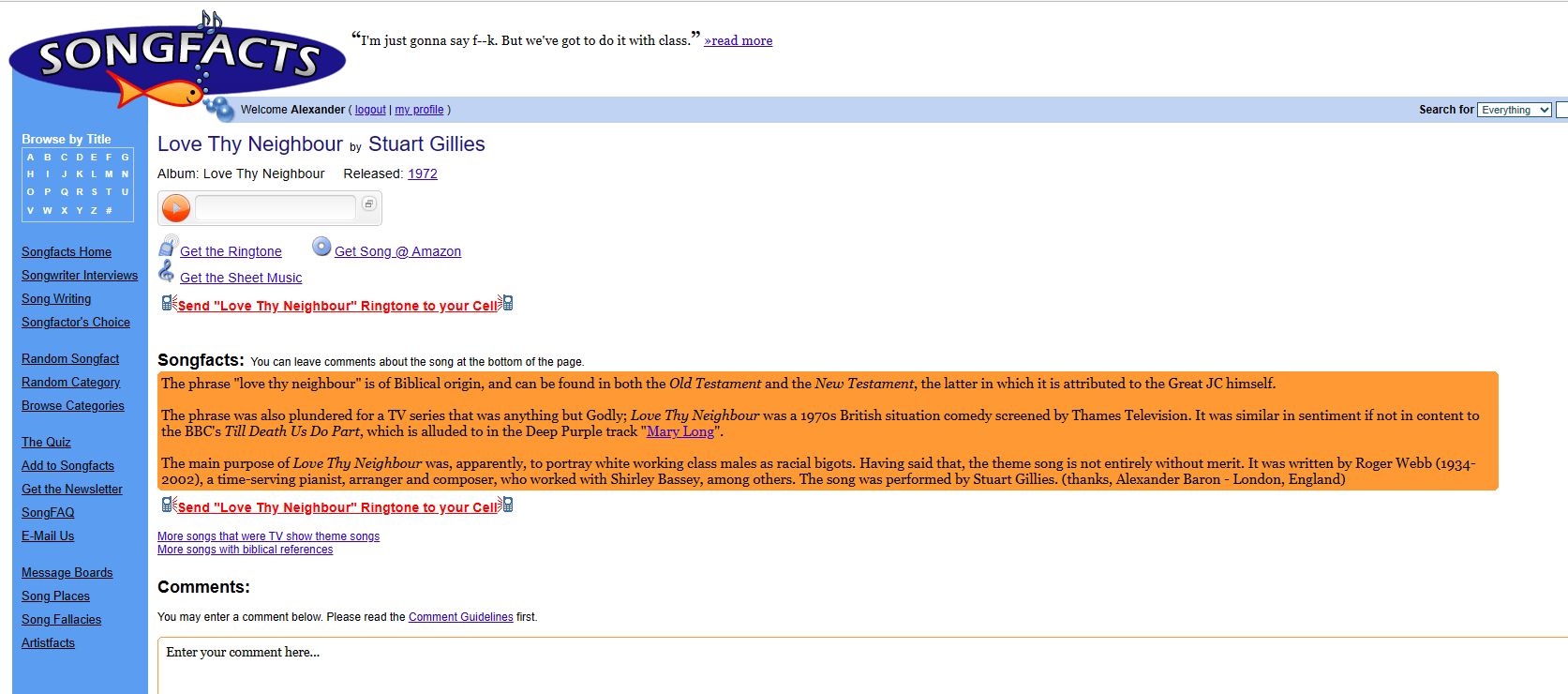
********************
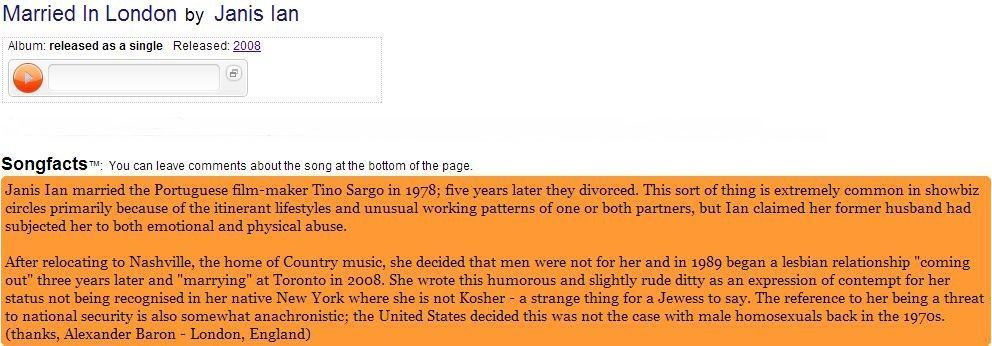
The above is the original songfact for Married In London; it was replaced shortly by the edited version because Janis Ian took issue with it!
********************
Persephone by Wishbone Ash
The first screengrab below is as the songfact appeared on November 24, 2010; the second is the augmented version as it appeared exactly five years later.
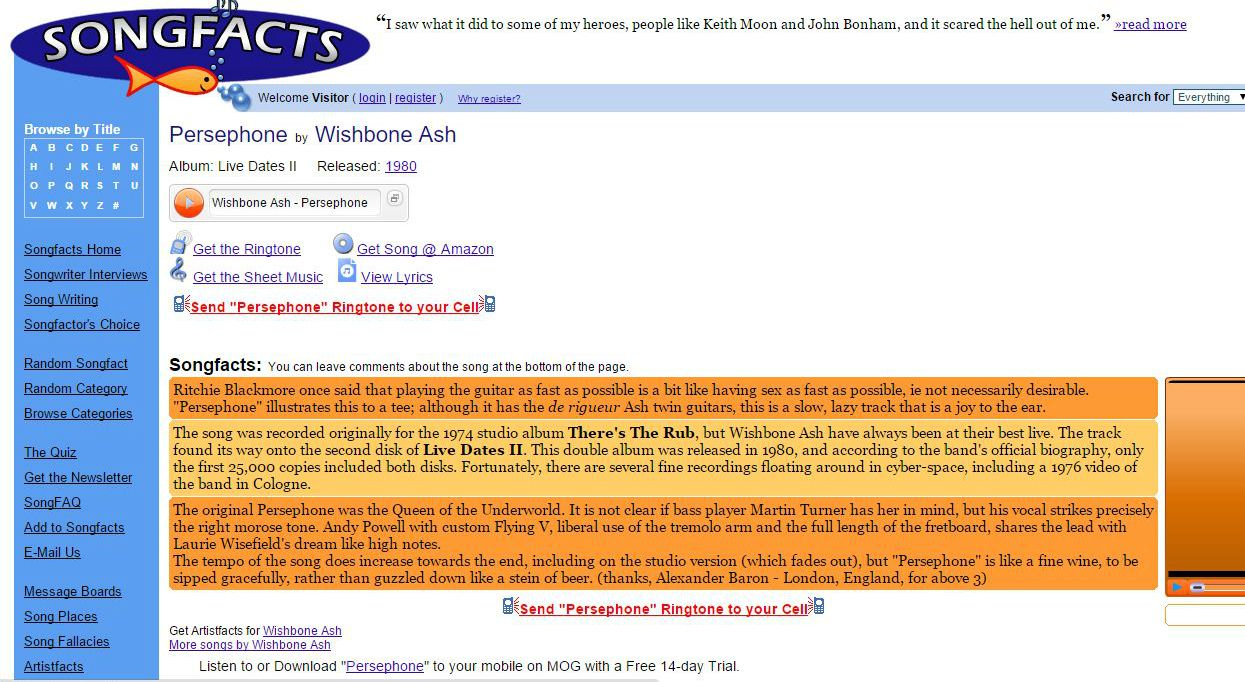

********************
Pilot Of The Airwaves by Charlie Dore
Released in 1979, this ode to an unnamed DJ was a monster hit for London born singer-songwriter Charlie Dore in 1980 reaching number 13 on the US Billboard chart; unsurprisingly it also received heavy airplay in the UK, although it didn’t do nearly as well.
Pilot Of The Airwaves runs to 3 minutes 53 seconds, but a radio edit minus the extended guitar solo and running to 3 minutes 15 seconds was also pressed. The B Side of the radio edit was Sleepless, but the B Side of the extended version was Falling. The song was produced for Island Records by Alan Tarney and former Shadows guitarist Bruce Welch.
********************
Postcards Of Scarborough by Michael Chapman

********************
Pretty Golden Hair by Al Stewart
This is an unusual song and one which mirrors Stewart’s later Old Compton Street Blues. The owner of the pretty golden hair here is surprisingly a young man who moves to the capital where he takes a mundane job of which he soon tires, and although possibly not homosexual he resorts to selling his body to finance a better standard of living. As usual though, it all goes sadly wrong, and as he grows older he moves progressively downmarket and ends up soliciting in public toilets. The song ends with his suicide.
It may be that unlike Old Compton Street Blues, Stewart based this on someone he actually knew, though probably not personally. In the song, the boy with golden hair is sent away to boarding school. Stewart was sent to boarding school by his widowed mother, and it may be that he heard this sad tale of an old boy from his contemporaries.
********************
Rock ’N’ Roll Widow by Wishbone Ash
Rock ’N’ Roll Widow is the last track on the 1973 album Wishbone Four; the song was inspired by a shocking incident at an early Wishbone Ash gig.
On September 5, 1971, while the band was onstage at an open air concert in Austin, Texas, a hot dog vendor on the edge of the crowd was shot dead by an irate customer. The story is related in the band’s official biography, Blowin’ Free.
According to Ben Grillot of the Austin Public Library, the murder was reported in the September 7, 1971 issue of the Austin Statesman in a story Vendor Shot For Sandwich? The victim was named as 32 year old Francisco Carrasco, a Cuban student; he was shot in the upper abdomen with a .38 calibre revolver. The gunman appears to have got away.
********************
Roots by Show Of Hands

********************
Roxie from the musical Chicago


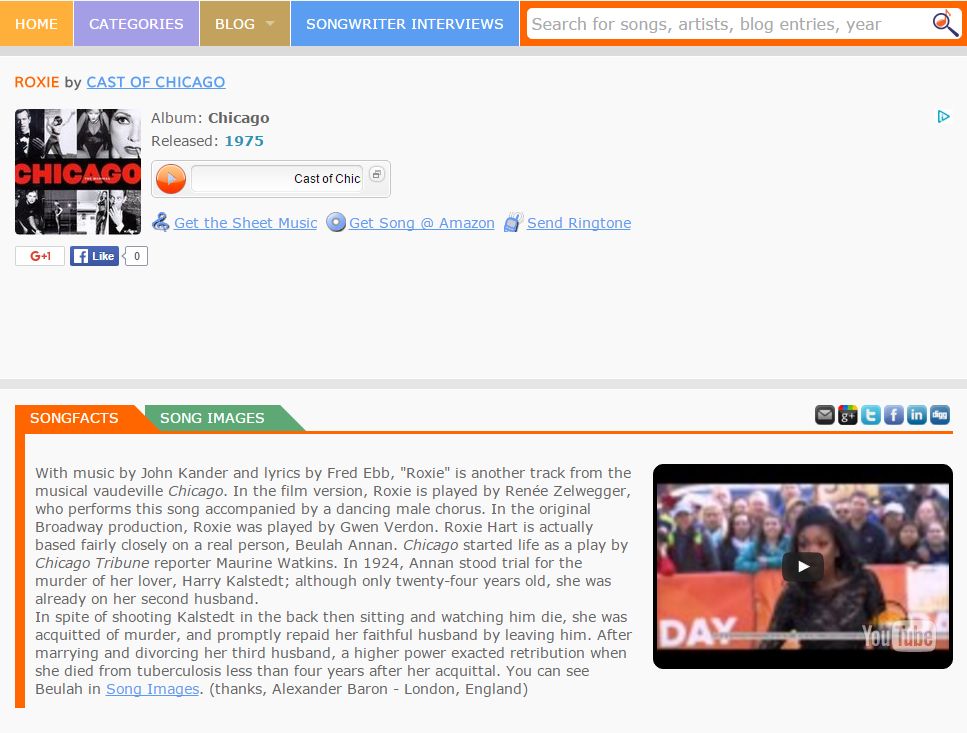
The second image above is the song image (subsequently deleted); the third is how it was originally submitted and published.
********************
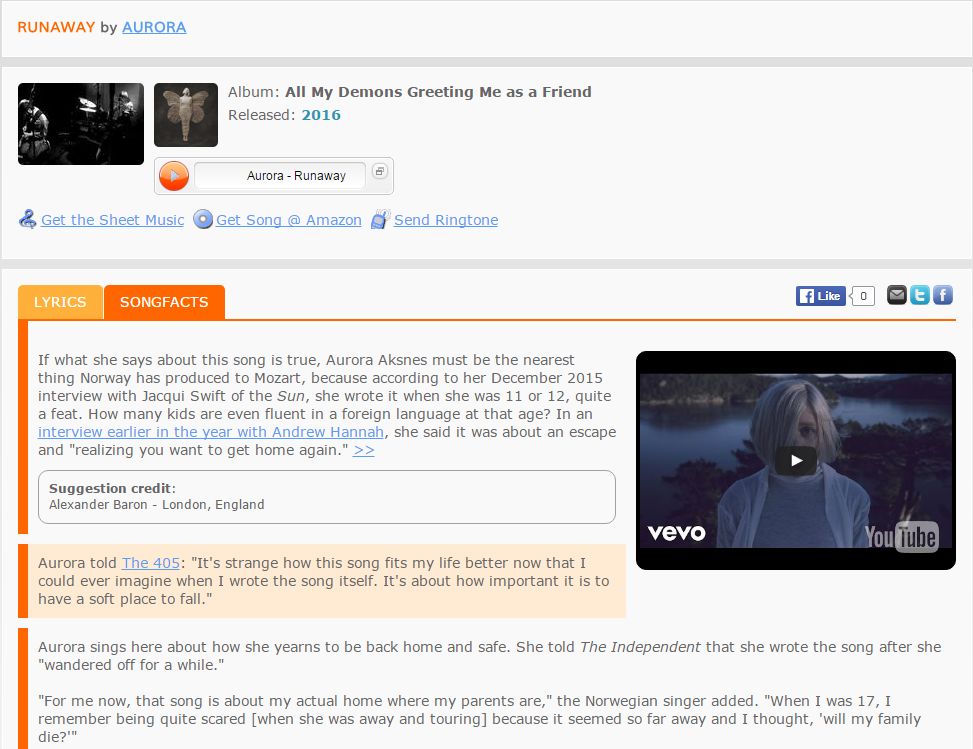
********************

Song Image for the above
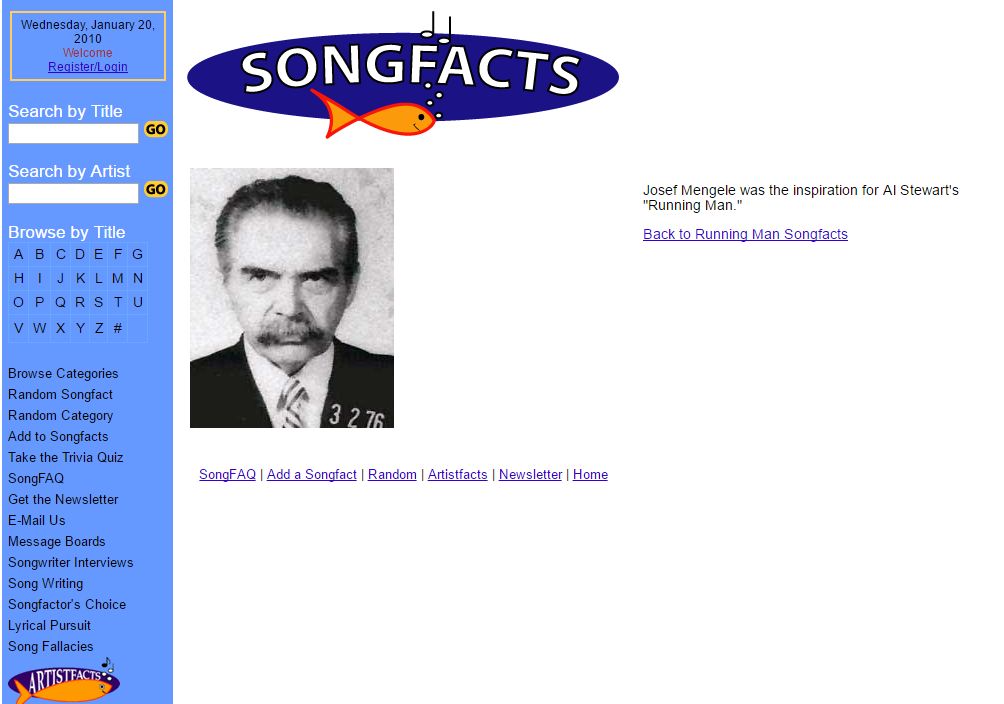
********************
Sea Of Wine by Michael Chapman

********************
She’s Got Balls by AC/DC
Having noticed the image for this songfact was missing, I e-mailed Carl in March 2016; he said “it looks like we took that down because the photo was unusable – too small and too copyrighted.”
At any rate, here they are both.
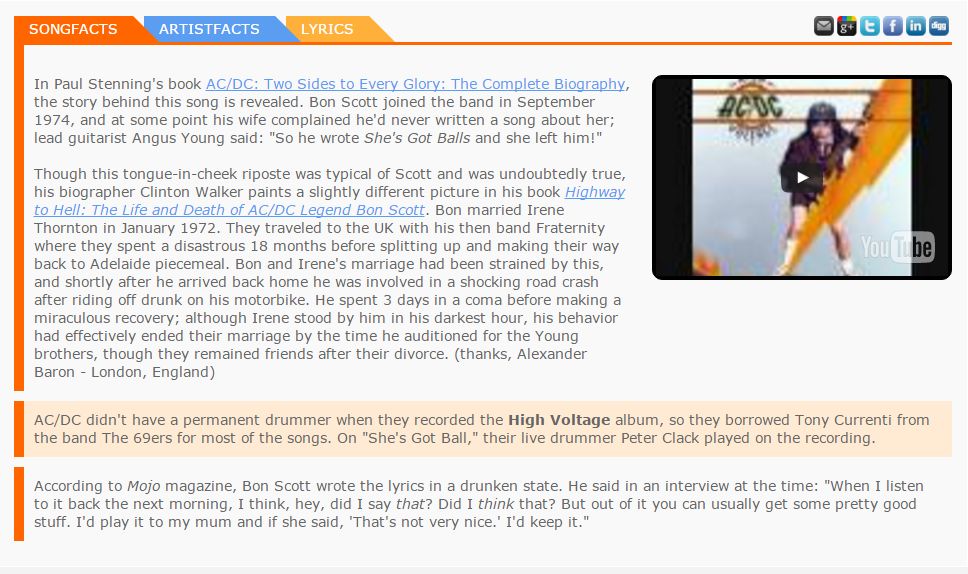

********************
Silver Thunderbird
Marc Cohn explained this song during a live recording sitting at the piano; when he was two or three years old, his Dad came home with a Silver Thunderbird. The most remarkable thing about it he said was that it made his Dad look cool.
He went on to explain the song really deals with what’s it like to not know your parents; they have an awe and a mystery about them they have a kind of an awe and a mystery about them. I used to wonder where my Dad went to work, where does he go in that thing? “...I recently read in a Psychology Today article – I read that all the time by the way...” – this drew laughter from the audience – “...that if you don’t know where your Dad works, that if you don’t have a picture of it in your mind, it leaves a permanent scar on your psyche, and that explained a hell of a lot to me”.
Purists will probably prefer Cohn’s original – live or otherwise – to the Jo Dee Messina cover version.
********************
(Sing If You’re) Glad To Be Gay
(Sing If You’re) Glad To Be Gay by the Tom Robinson Band (TRB) was recorded as part of a live EP in November 1977 and appears on Robinson’s critically acclaimed debut album Power In The Darkness. As might be expected, this song calls on homosexuals to “come out” and declare their sexuality with pride. Robinson was an out – though not effeminate – homosexual at the time, although in later life he married and raised a family.
The song contains the interesting couplet:
“There’s no nudes in Gay News, our one magazine
But they still found excuses to call it obscene”
Those familiar with the story behind this sentence might beg to differ.
In June 1996, Gay News published a poem by the academic James Kirkup, The Love That Dares To Speak Its Name (a pun on Oscar Wilde). This “poem” described a centurion performing sexual acts on the dead body of Christ, and caused grave offence to many people, especially Christians.
As a result of this, the Christian activist Mrs Mary Whitehouse brought a prosecution for blasphemous libel – the first in Britain since 1921 – against the paper and its editor, Denis Lemon. The trial, in July 1977, resulted in their conviction, a fine for both defendants, and a suspended sentence for Lemon; Kirkup was not prosecuted.
The same issue of the journal contained an article by an anonymous paedophile in defence of his perversion.
********************
Skyline Pigeon In Philip Norman’s book Sir Elton: The Definitive Biography, this early Elton John/Bernie Taupin composition is described as “the wistful song of a captive bird turned loose by a prisoner”.
Skyline Pigeon sounds as though it may have been inspired by the 1962 film Birdman Of Alcatraz, which is a sanitized biopic of double killer Robert Stroud.
Elton recorded the song for his debut album Empty Sky, through which the theme of imprisonment – unjust or otherwise – runs. It was first released in August 1968 though, by Roger Cook, and
later that same month by Guy Darrell. Darrell had a minor hit in 1973 with I’ve Been Hurt, but never lived up to the hype. When Elton first recorded it, he
used a harpsichord, and in the style of the album the song was light on production, but in 1973 it was re-released as the B-Side of Daniel with a full arrangement. It was also recorded by Geoff Long, a
blind musician and occasional songwriter from Sydenham, London for his 2004 CD After The Party.
********************
Soulful Lady by Michael Chapman

********************
Storm In A Tea Cup
The phrase “a storm in a tea cup” means a problem that is not as big as it appears; a song with this title, credited to Rubin-Roker, was first recorded by The Fortunes. Shortly after, it was recorded by Lynsey de Paul as the B Side of her first single, Sugar Me. Rubin was Lynsey’s birth name; her collaborator Ron Roker started out as a song plugger before moving into songwriting.
Storm In A Tea Cup sold an impressive three million copies but netted Lynsey a mere six thousand pounds in royalties. “It was impossible not to get ripped off in the Seventies,” she told OK magazine in a 1996 interview.
********************
Strawberry Girl
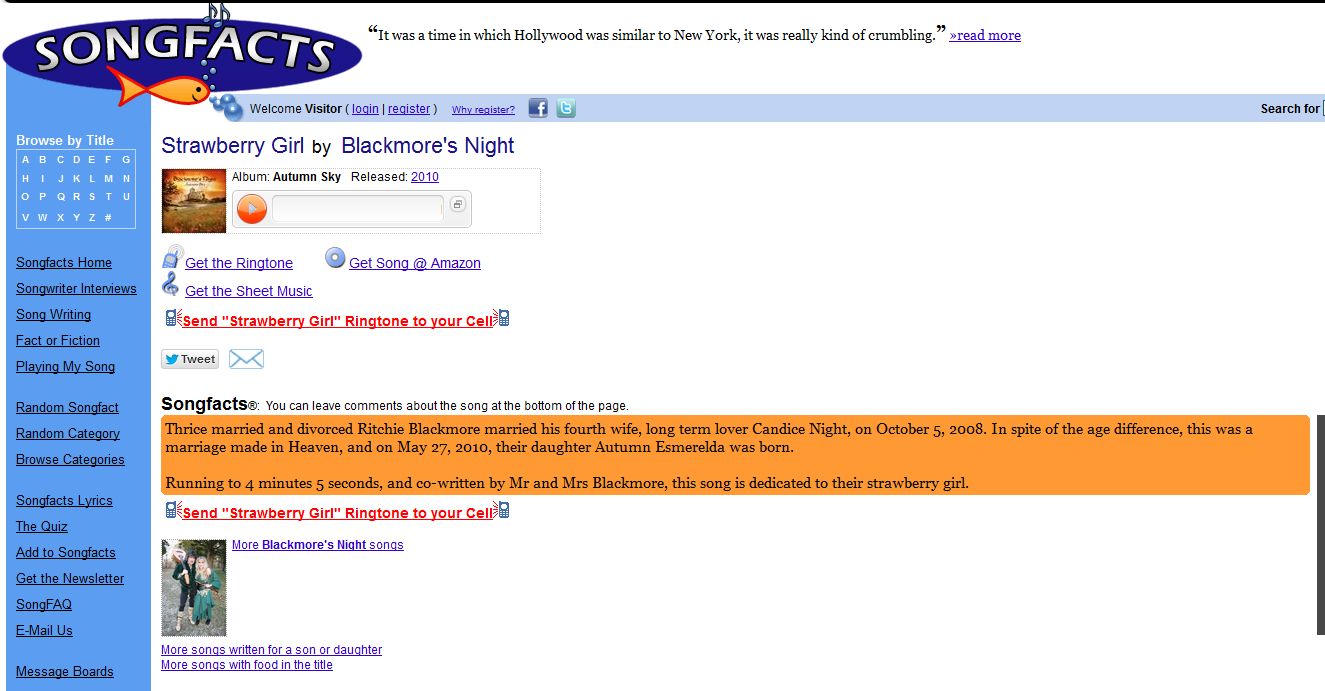
The above is the songfact as originally submitted and published.
********************
The Hippopotamus
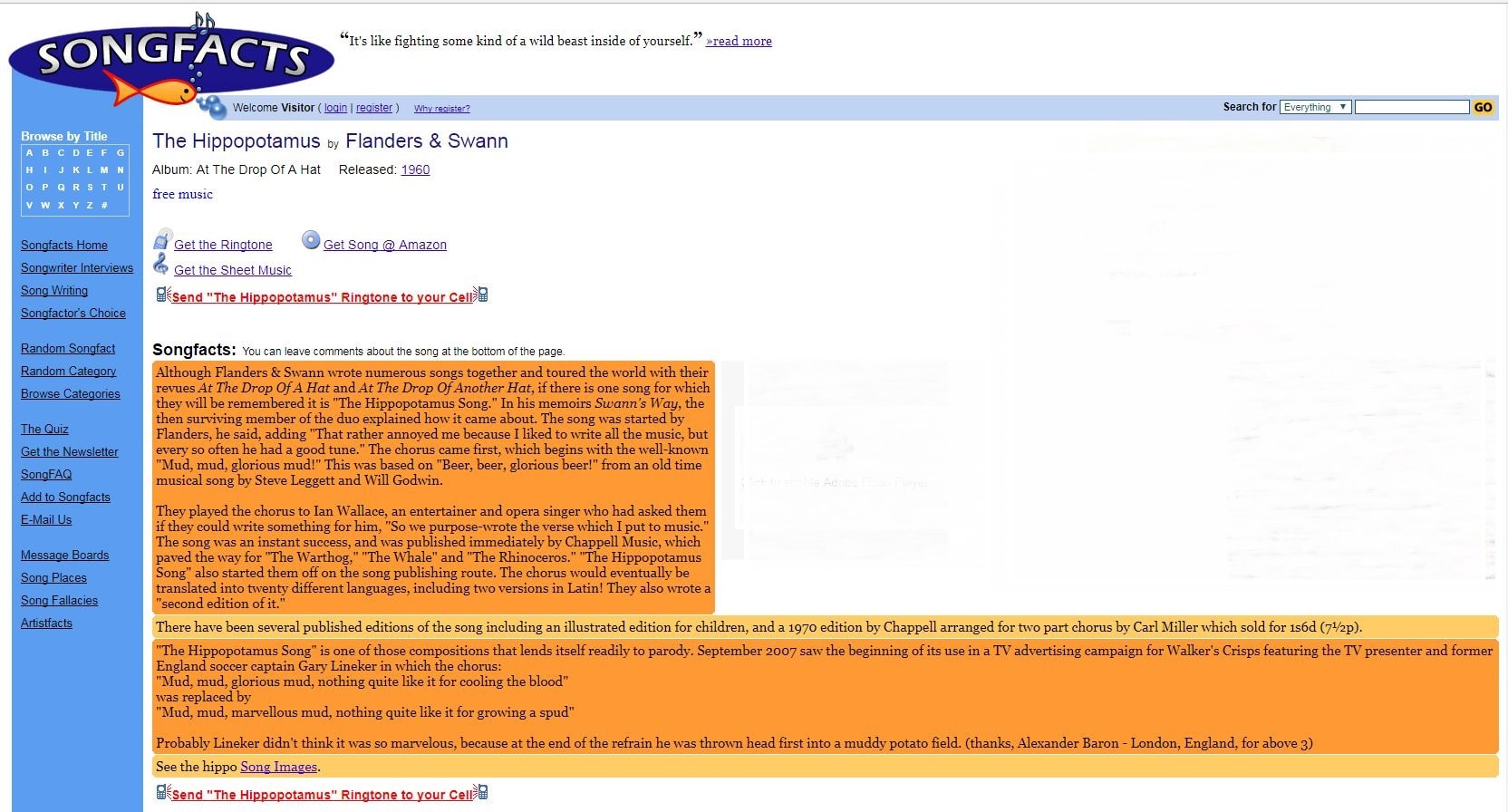

The song image for the above has been deleted; it was added here December 29, 2020.
********************
Toutes Les Etoiles
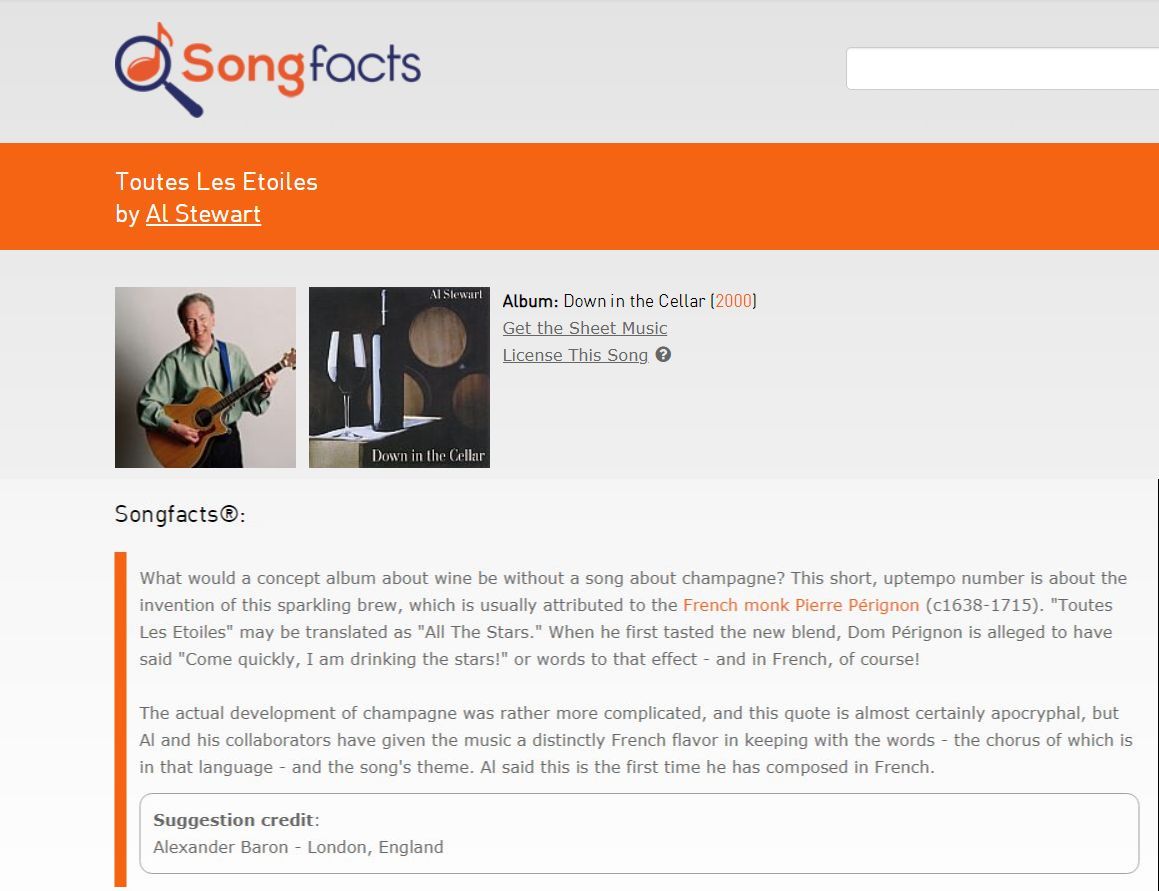
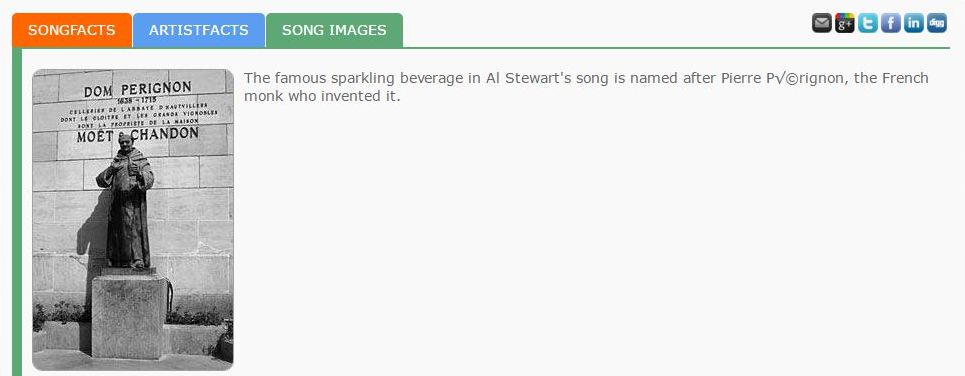
The above is the original songfact and song image; the latter was changed later for some reason.
********************
Under A Violet Moon

The screengrab above was taken on the site December 3, 2015; the one below is from the Internet Archive, August 5, 2009.
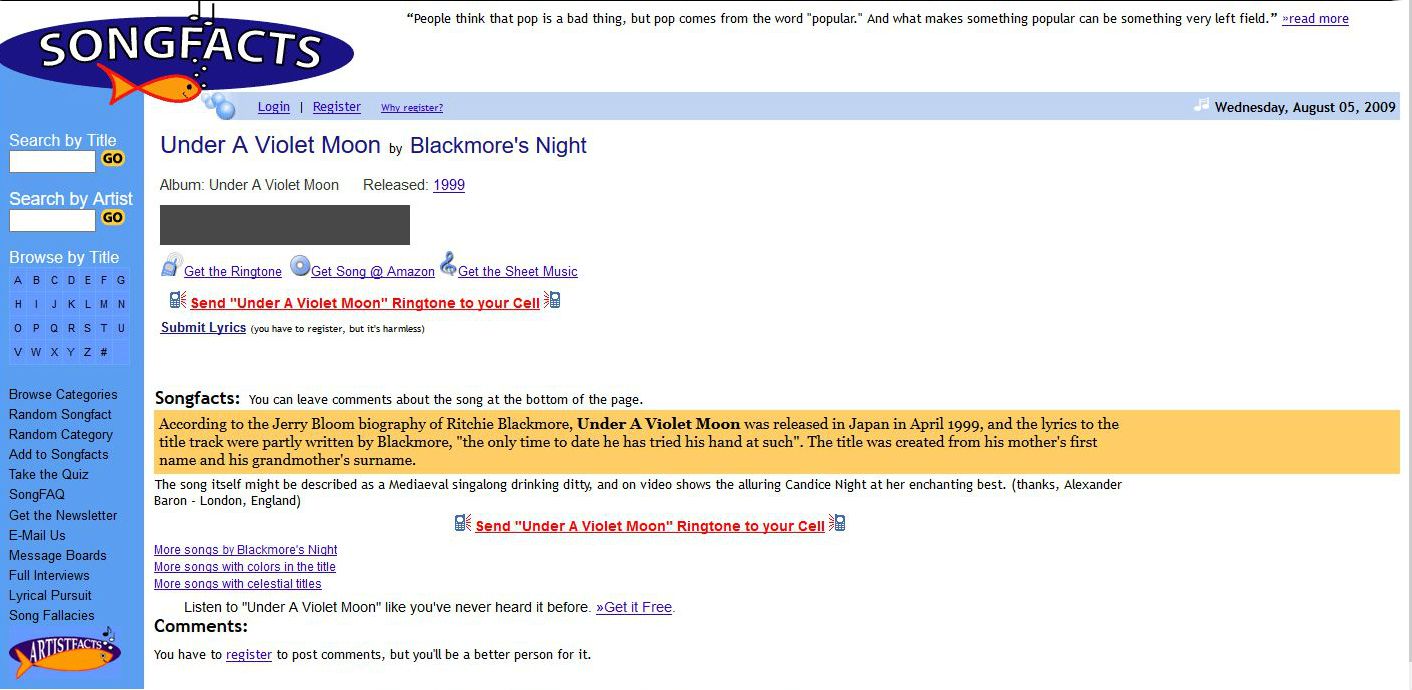
********************
Wellington The Skellington by Michael Chapman

********************
Wonderful Woman
This Chuck Berry composition is said to have been recorded between 1991 and 2004. Chuck was born in 1926, so do the math. Uptempo, it is difficult to believe it was not written by a much younger man, but those au fait with his early work will have no hesitation in identifying it as his.
Wonderful Woman is dedicated to his wife Themetta whom he married on October 28, 1948. In view of some of his antics – which are best not mentioned here – she is probably not simply wonderful but a saint!
In 2017, Chuck was due to release his first album since 1979, but sadly never lived to see it. He died age ninety on March 18, shortly before its scheduled release leaving not only a wife of sixty-eight years! but a legacy that inspired directly or indirectly almost every musician who has picked up an electric guitar since 1955.
********************
You Can’t Teach An Old Dog New Tricks
Seasick Steve appeared on the BBC Breakfast news programme on May 31, 2011 where he performed with one of his legendary homemade instruments. As well as playing part of the video for the title track of his new album, the two presenters asked him what had inspired it. The song has a fairly obvious autobiographical origin.
Steve Wold was born in 1941, but it was not until he appeared on Jools Holland’s Hootenanny programme on New Year’s Eve 2006 that he could be said to have arrived. Since then he has achieved both well-deserved commercial success and critical acclaim. Another “old dog” who plays on this track is John Paul Jones, who was born January 3, 1946.
In spite of his innate modesty, it is difficult to believe that Steve has learned nothing since his fortuitous run-in with Jools Holland, but perhaps he hasn’t heard Dennis Waterman’s recording of It’s Alright.
Back To Articles Index
Back To Site Index